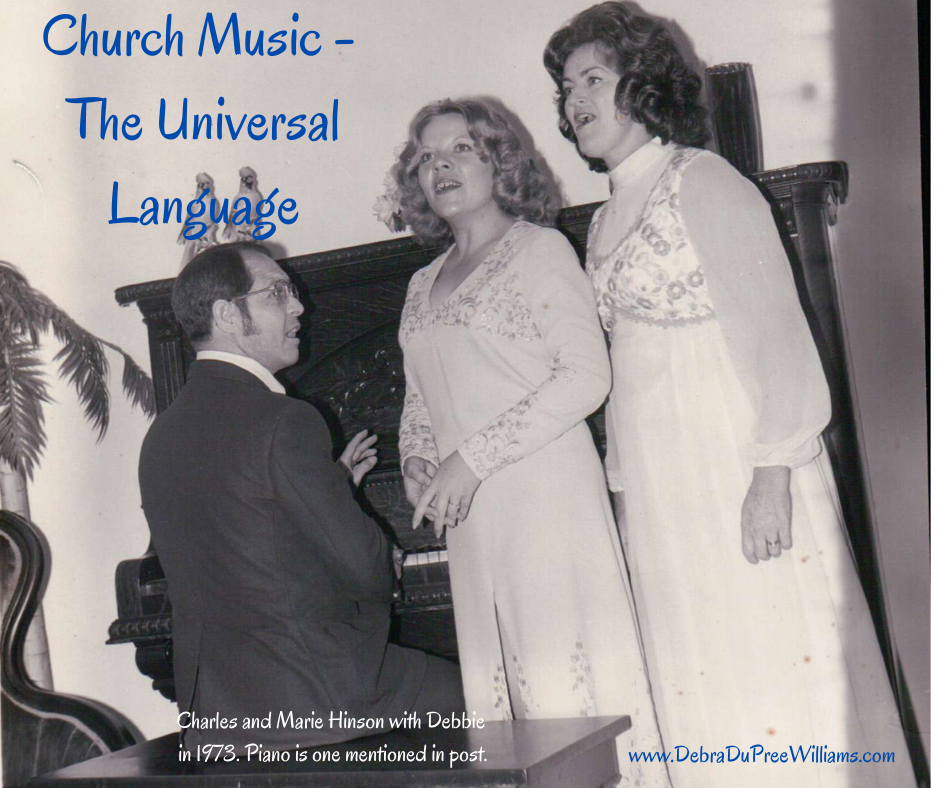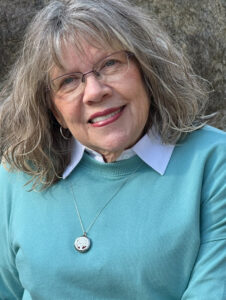Church Music, The Universal Language

If you’ve read my bio, you know that music has played an important role in my life. Mama told me I entered this world on a High C. No doubt, that’s the truth. From the very beginning of my life, I was destined to sing God’s praises. To me, church music is the universal language.
My sister and I sang together when we were girls. She’s seven years my elder. She taught me the melodies and the words, and she sang alto to my soprano. Together, we sang at more civic club meetings and in more nursing homes (old folks’ homes in those days) than we can remember.
While in high school, my choral director and his wife, Charles and Marie Hinson, and I formed a Gospel trio. I still have fond memories of singing with them back in those days. Some weeknights would find them, my guidance counselor, and my algebra teacher who later became the brother-in-law of Marie gathered in our living room around my grandmother’s old 1905 Ellington upright-grand. I can still see Mama sitting in the corner chair, clapping her hands, and requesting we sing, “Give Up”.
By this time, I knew I’d go on to study music. When I met Andrew Gainey at The Auburn Music Institute summer camp one summer, I knew I wanted to study with him. That is what led me to Birmingham-Southern College. It didn’t hurt that I was a Methodist and the college was, too.
MUSIC MAJOR
At BSC, I studied vocal performance and music education, earning a degree in each. Though classically trained, my first love has always been Southern Gospel. My parents often took me with them to all-night Gospel singings as we called them back then. Now, they’d be concerts in an outdoor venue.
While in college, I sang in a handful of church choirs. Most music majors did this. I finally settled in at Independent Presbyterian Church on Birmingham’s southside. Some of my happiest, most fulfilling musical experiences took place while singing in that wonderful choir under the direction of Choirmaster and organist, Joseph W. Schreiber. He’s in heaven now. If he isn’t the choir director, I’ll be surprised. The man knew how to create beautiful music from people of diverse talents. When I got married, my husband became a part of this outstanding choir.
We had the privilege of singing Braham’s Requiem in German, no less. Mozart’s Requiem. Faure’s and Durufle’s Requiem. The entirety of Handel’s Messiah. We’ve sung in languages most people have never heard of, all while part of this excellent church choir.
A FAMILY OF MUSICIANS
Once we had children, four sons, they were reared on lullabies and rock. Not a rocking chair, but rock. Their daddy loved rock and it often played in our home and in our car. To this day, they cite their favorite rock bands as some he introduced them to.
All four of those boys are excellent musicians. One is a professional bassoonist. My sister’s children are both excellent musicians. Sis’s grands are either pastors or worship leaders. All are musically talented.
So, where am I going with all of this? It’s clear that music has the power to pull people in—either as instrumentalists, vocalists, or maybe even both.
MUSICAL PREFERENCES
This past Sunday, our pastor touched on some sticky points of contention within many churches today. Our own isn’t exempt. One thing that seems to divide us these days is the music of the church.
I will admit, I’d rather sing hymns when I go to worship. It’s just what I’m accustomed to. I don’t like the blasting guitars and the banging way-too-loudly drums. It makes worship seem like more of that rock music my husband played for our children.
But times have changed. The time to reach people is drawing short. We need to reach the lost young people. If we don’t reach them, maybe through that universal language of music, who will spread the Gospel to the next generation?
Hymnals are more-or-less gone. A thing of the past.
But praise music, worshiping God with hands raised, maybe even dancing in the aisles, and yes, that big screen with just the words, is alive and well in most churches these days.
We have two choices. We can embrace the new way of worship, or we can stay home with our televangelists and miss out on fellowship with our brothers and sisters in Christ.
I just read the 150th Psalm. May I suggest you go read that before you decide? It could just change your mind about today’s praise and worship music.
Blessings, y’all!
This is that song my Mama loved so much. We didn’t do it this slowly. Our rendition was a lot peppier. But I love Michael English, have for a whole lot of years. And look at all those other familiar faces in this group. God bless them. Now THIS is MY kind of music!! Blessings to each of you.

The Conversation
I love reading your posts. And as I’ve said before, I also love the music videos you include at the end of each one. This one is great. Music has always been a big part of my family’s worship time, too. I was in our choir at church, but I’m a “leaner”. I often have to “lean” into the person beside me to keep me on pitch. 🙂
Thank you, Tim. That means so much to me. We’re not asked to sing every note in tune, only offer a joyful noise! Remember that when you lift your voice in praise!
I love the hymns and the contemporary music. Grateful some churches see the value in both. Thanks for sharing.
I love doing both, too. I still prefer hymns in church. With a hymnal, not a screen.